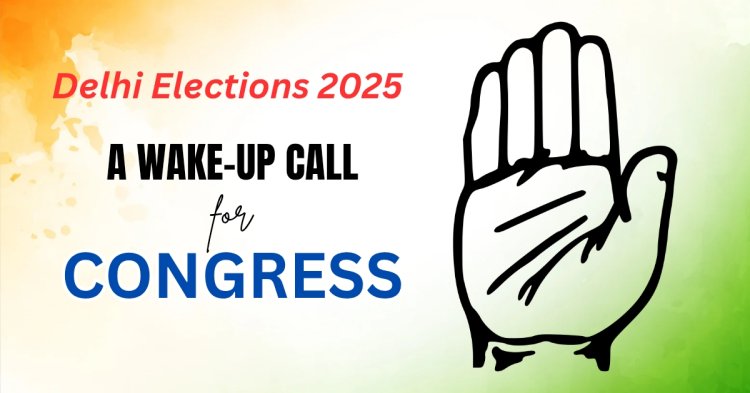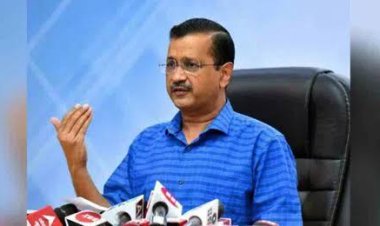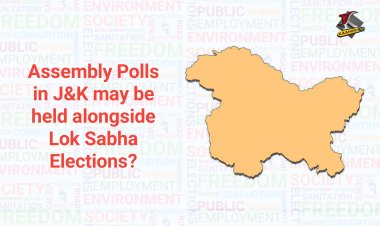Delhi Assembly Elections 2025: A Wake-Up Call for Congress

The 2025 Delhi Assembly elections have delivered yet another humiliating defeat to the Congress party, reinforcing its steady decline into political irrelevance. While the BJP stormed to victory and the AAP put up a strong fight to retain its ground, Congress remained a mere spectator - leaderless, voiceless, and visionless. This was not just an electoral loss; it was a wake-up call that the party can no longer afford to ignore.
Once the undisputed force in Delhi under Sheila Dikshit, Congress has now gone three consecutive elections without winning a single seat. It has become politically invisible, failing to present a viable alternative to either the BJP’s aggressive governance model or the AAP’s welfare-oriented politics.
The big question now is: Will Congress finally acknowledge its mistakes and fight back, or will it continue sleepwalking toward political extinction?
Congress’s failure in Delhi is not an isolated incident. It is part of a larger trend of decline that the party has been experiencing across multiple states. Once a dominant force in Indian politics, Congress has steadily lost ground due to weak leadership, lack of vision, and an outdated organizational structure. The party’s electoral setbacks in states like West Bengal, Uttar Pradesh, Maharashtra, Madhya Pradesh and Rajashthan highlight its deep-rooted crisis.
Congress once had a strong base in West Bengal, but its failure to counter Mamata Banerjee’s rise led to its gradual decline. Over the years, it became a non-entity in the state, ceding political space to the TMC and BJP. By the 2021 Assembly elections, Congress was completely wiped out, failing to win a single seat for the first time. Despite being part of the INDIA alliance, Congress has failed to revive itself, struggling to remain relevant in Bengal’s bipolar political battle.
Uttar Pradesh, the country’s most politically significant state, offers another telling example. There was a time when Congress ruled Uttar Pradesh unchallenged, but the emergence of powerful regional parties like the Samajwadi Party (SP) and the Bahujan Samaj Party (BSP), along with the BJP’s aggressive expansion, has left Congress struggling to win even a handful of seats. In the 2017 Assembly elections, Congress tried to shore up its position by forming an alliance with the SP. However, this alliance turned out to be disastrous. The two parties, despite having common interests, failed to harmonize their strategies, resulting in a severe dilution of their collective appeal. The failure was so evident that in the 2019 Lok Sabha elections, Congress chose to contest separately, and as a consequence, the BJP managed to capture 62 seats in Uttar Pradesh while Congress was reduced to just one seat—Raebareli, held by Sonia Gandhi. The situation did not improve in subsequent elections; in the 2022 Assembly polls, Congress again contested on its own under Priyanka Gandhi’s leadership and managed to win only two out of 403 seats. The repeated alliance failures in Uttar Pradesh have underscored a critical point: without a cohesive opposition front, Congress and its ideological partners cannot effectively challenge the dominant forces in the elections.
Congress was once a dominant force in Maharashtra, forming governments for decades. However, infighting, weak leadership, and poor alliance management have significantly eroded its influence. In the 2019 Assembly elections, Congress finished fourth, behind the BJP, Shiv Sena, and NCP. Even after forming the Maha Vikas Aghadi (MVA) government with the Shiv Sena and NCP, the alliance remained unstable and ultimately collapsed due to internal power struggles. Today, Congress struggles to stay relevant in a state where it once commanded immense support.
Madhya Pradesh is a classic example of Congress losing power due to its own internal conflicts. In the 2018 Assembly elections, Congress managed to defeat BJP and form a government under Kamal Nath. However, the party’s failure to manage its young leadership, particularly Jyotiraditya Scindia, resulted in a major setback.
In 2020, Scindia and his loyal MLAs switched to the BJP, leading to the collapse of the Congress government and the return of Shivraj Singh Chouhan as CM. This betrayal should have been a lesson, but Congress did not learn. In the 2023 Assembly elections, Congress failed to organize a strong, united campaign. Despite anti-incumbency against BJP, Congress lost to the saffron party by a huge margin, proving once again that infighting and weak leadership are its biggest weaknesses.
Rajasthan is another example where Congress failed despite having an advantage. In the 2018 Assembly elections, the party won and formed the government under Ashok Gehlot. However, infighting between Gehlot and Sachin Pilot severely damaged the party’s image. While BJP built a strong election strategy in 2023, Congress remained divided. The result? Congress lost power, and BJP returned to government.
This pattern repeats across states: whenever Congress is given a chance, it squanders the opportunity due to weak leadership and internal conflicts.
In the 2023 Karnataka elections, Congress defeated the BJP and formed the government, but the victory has been anything but smooth. Infighting, governance challenges, and a weak party structure have made the administration vulnerable. The BJP is already working to stage a comeback, and if Congress fails to maintain a united leadership, it risks losing Karnataka in the next elections, just as it did in Madhya Pradesh and Rajasthan.
Why Did Congress Fail in Delhi?
The 2025 Delhi elections exposed several deep-rooted weaknesses within Congress. The absence of leadership, lack of grassroots presence, outdated campaign strategies, and failure to connect with voters all contributed to its humiliating defeat.
A major factor in Congress’s downfall was the lack of a strong leader. While BJP had experienced campaigners like Parvesh Verma and Manoj Tiwari and AAP had effective leaders like Atishi and Saurabh Bharadwaj, Congress failed to project a single recognizable face. Without a visible and dynamic leader, voters had no reason to see Congress as a serious alternative.
Additionally, Congress’s organizational collapse was evident. Unlike the BJP and AAP, which have strong booth-level workers and grassroots networks, Congress has lost its ground-level connect in Delhi. The party failed to mobilize workers, engage in door-to-door campaigning, or build local networks. The lack of organizational structure made Congress virtually invisible in the electoral contest.
Another critical mistake was the absence of a clear campaign vision. While the BJP focused on economic development and law & order and AAP promised free electricity, water, and education, Congress failed to articulate a compelling agenda. Without a clear vision or strong promises, the party could not attract voter interest.
Moreover, Congress’s failure to connect with young voters proved costly. Delhi has a large youth population, and both BJP and AAP actively engage with young voters through digital campaigns and social media outreach. Congress, on the other hand, continues to rely on outdated campaign methods and has not invested in digital outreach. Young voters see Congress as irrelevant, which is a significant challenge for the party’s future.
Another major blunder was its poor alliance strategy. In 2019, Congress refused to form an alliance with AAP, which allowed BJP to sweep all seven Lok Sabha seats in Delhi. The same mistake was repeated in 2025, as Congress failed to coordinate with opposition parties. In contrast, in states like Bihar, where Congress allied with RJD, the party at least maintained some level of relevance.
How Can Congress Revive Itself?
Despite repeated failures, Congress still has a chance to recover—but only if it takes bold and immediate action.
- Appoint a Strong Leader for Delhi – Congress needs a credible face who can rebuild voter confidence.
- Rebuild Its Organizational Structure – The party must train booth-level workers, engage in community outreach, and mobilize workers effectively.
- Develop a Clear and Bold Vision – Congress must offer solutions on issues such as pollution, employment, housing, and traffic management to attract urban voters.
- Invest in Digital and Youth Outreach – The party must modernize its campaign strategy, aggressively use social media, and engage with university students and young professionals.
- Form Strategic Alliances – Congress must stop making last-minute alliance decisions and instead focus on long-term strategic partnerships to strengthen its position in multi-party contests.
The 2025 Delhi elections were not just another defeat for Congress—they were a final warning. If the party does not wake up, rebuild, and fight with a clear strategy, its decline will be permanent. The Congress of Indira Gandhi knew how to fight back from crises, but today’s Congress appears too weak to even try.
The choice is simple: Rebuild or disappear. If Congress fails to take this defeat seriously, history will remember this moment as the beginning of the end.










